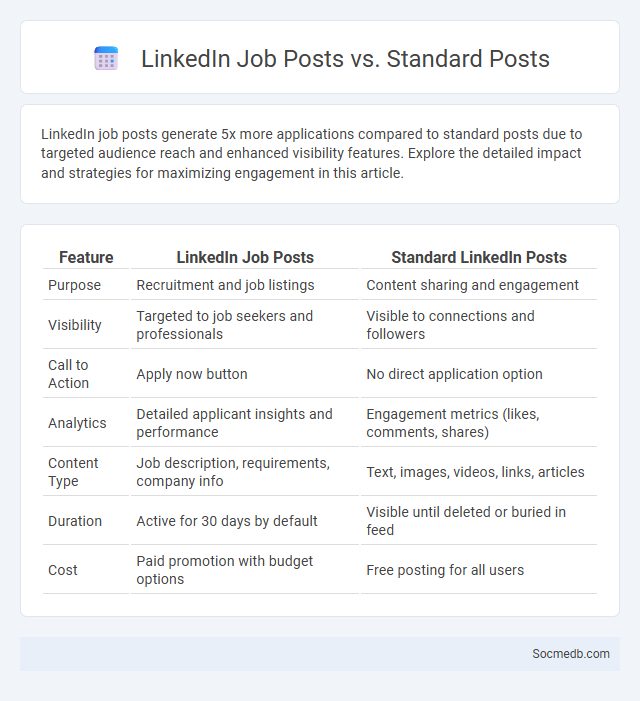
Photo illustration: LinkedIn Job Posts vs Standard Posts
LinkedIn job posts generate 5x more applications compared to standard posts due to targeted audience reach and enhanced visibility features. Explore the detailed impact and strategies for maximizing engagement in this article.
Table of Comparison
| Feature | LinkedIn Job Posts | Standard LinkedIn Posts |
|---|---|---|
| Purpose | Recruitment and job listings | Content sharing and engagement |
| Visibility | Targeted to job seekers and professionals | Visible to connections and followers |
| Call to Action | Apply now button | No direct application option |
| Analytics | Detailed applicant insights and performance | Engagement metrics (likes, comments, shares) |
| Content Type | Job description, requirements, company info | Text, images, videos, links, articles |
| Duration | Active for 30 days by default | Visible until deleted or buried in feed |
| Cost | Paid promotion with budget options | Free posting for all users |
Understanding LinkedIn Job Posts: Features and Functionality
LinkedIn job posts provide employers with targeted features such as detailed job descriptions, skill requirements, and application tracking tools to streamline candidate sourcing. The platform utilizes AI-driven algorithms to match job listings with relevant professionals based on their profile data, enhancing recruitment efficiency. Employers can also leverage analytics insights to monitor post performance and optimize outreach strategies within LinkedIn's professional network.
What Are Standard Posts on LinkedIn?
Standard posts on LinkedIn consist of text updates, images, videos, links, or documents shared directly on a user's feed to engage professional connections. These posts enable users to share insights, industry news, and career achievements, boosting visibility within their network. Engagement metrics such as likes, comments, and shares help amplify reach and influence on the platform.
LinkedIn Feed Ranking Algorithm: An Overview
LinkedIn's feed ranking algorithm prioritizes content by analyzing user engagement, relevance, and content quality to deliver personalized experiences. It leverages machine learning models that assess factors like connection strength, post recency, and content type to rank posts effectively. The algorithm continuously updates to enhance user interaction by promoting meaningful professional networking and knowledge sharing.
Visibility Differences: Job Posts vs Standard Posts
Job posts on social media typically receive higher visibility than standard posts due to platform algorithms prioritizing content that promotes employment opportunities. This increased exposure helps target a specific audience actively seeking job openings, enhancing recruitment efficiency. Understanding these visibility differences can improve your content strategy and maximize engagement for both job and standard posts.
Engagement Metrics: What Drives Interaction on LinkedIn?
Engagement metrics on LinkedIn are driven primarily by content relevance, post timing, and audience targeting. Posts featuring industry insights, professional achievements, and interactive elements like polls or questions generate higher interaction rates. Consistent use of rich media such as videos and infographics further boosts likes, comments, and shares, enhancing overall visibility on the platform.
Audience Targeting: How Posts Reach the Right People
Social media platforms use advanced algorithms and data analytics to analyze user behavior, interests, and demographics, ensuring your posts reach the most relevant audience. By leveraging tools such as custom audiences, lookalike audiences, and interest targeting, you can precisely define who sees your content, maximizing engagement and conversion rates. Understanding these targeting options empowers you to deliver tailored messages that resonate with your ideal customers, boosting your campaign's effectiveness.
Content Format and Best Practices for Each Post Type
Optimizing social media content involves tailoring formats to platform-specific best practices to maximize engagement and reach. Use high-quality images and short videos for Instagram to capture attention quickly, while Twitter favors concise text updates with relevant hashtags for immediate impact. Your strategy should include interactive formats like polls on Facebook and LinkedIn articles for professional insights, ensuring each post type is designed to engage your target audience effectively.
Employer Branding Through Job Posts and Standard Content
Job posts and standard content play a crucial role in employer branding by showcasing company culture, values, and employee experiences to attract top talent on social media platforms. Consistent, authentic messaging in job postings and regular content updates enhances the company's reputation and increases engagement with potential candidates. Leveraging multimedia elements like videos, employee testimonials, and behind-the-scenes content strengthens employer brand perception and recruitment effectiveness.
Optimizing for LinkedIn Feed Ranking Success
LinkedIn's feed ranking algorithm prioritizes content that sparks meaningful interactions, emphasizing comments and shares from connections in a user's network. Incorporating relevant keywords and industry-specific hashtags enhances visibility by aligning posts with trending professional topics and search queries. Posting consistently during peak engagement hours coupled with authentic, value-driven content significantly boosts LinkedIn feed ranking and expands organic reach.
Choosing the Right Post Type for Recruitment and Brand Growth
Selecting the right post type on social media significantly impacts recruitment efforts and brand growth by engaging your target audience effectively. Visual content like videos and infographics boosts visibility and shares, while authentic employee testimonials foster trust and attract top talent. Tailoring posts to your audience's preferences ensures Your brand message resonates clearly, driving higher interaction and talent acquisition.
 socmedb.com
socmedb.com